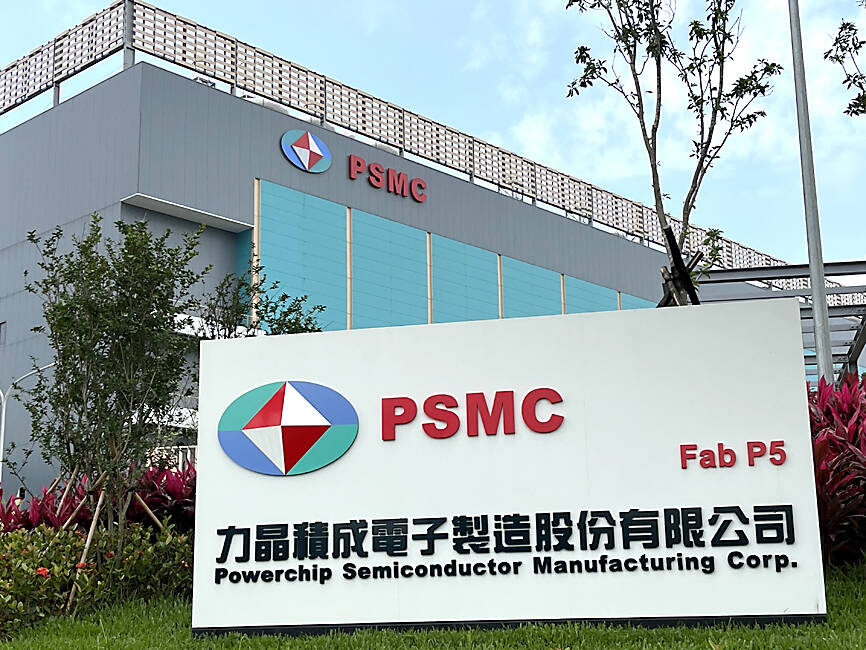Contract chipmaker Powerchip Semiconductor Manufacturing Corp (力積電) yesterday posted deeper quarterly losses of NT$3.33 billion (US$113.07 million) for last quarter, dragged by impairment losses related to foreign-exchange rate fluctuations.
That compared with losses of NT$1.1 billion in the first quarter and NT$1.96 billion in the second quarter last year, the chipmaker said in a report.
Powerchip reported losses per share of NT$0.8 last quarter, expanding from NT$0.26 a quarter earlier and NT$0.54 a year ago.

Photo: Grace Hung, Taipei Times
The appreciation of the New Taiwan dollar incurred NT$1.59 billion in impairment losses on the company’s US dollar-denominated assets, Powerchip president Martin Chu (朱獻國) told an online earnings conference.
The NT dollar gained about 4.89 percent to NT$31.2 against the greenback last quarter, Chu said.
The strong local currency also negatively affected the company’s gross margin, leading to a bigger gross loss of NT$1.02 billion last quarter, compared with gross loss of NT$536 million in the first quarter and gross loss of NT$486 million in the second quarter last year, he said.
Customers are becoming more prudent about placing new orders for the third quarter, as front-loading demand for logic chips cools down ahead of a US tariffs deadline on Friday next week, Powerchip said.
“It requires more observations to get a clearer picture about the third-quarter situation,” Chu said. “Visibility remains low and customers are more conservative.”
Powerchip said it is seeing encouraging signs of recovery with new orders for memory chips flowing in as the world’s major players phase out older-generation DDR4 DRAM chips and low-density single-level-cell NAND flash memory chips.
Improving demand has driven up DRAM prices since last month, Chu said.
The company expects the momentum to carry over into the second half of this year, thanks to recovering demand and healthy inventory.
In addition, demand is increasing for silicon interposers used in advanced Chip-on-Wafer-on-Substrate packaging technology for artificial intelligence chip manufacturing processes, the firm said.
To cope with growing demand, it plans to set aside new capital expenditure of NT$2.65 billion this year to double its silicon interposer capacity, the company added.
The capacity expansion would boost revenue contribution from its silicon interposer business to about 8 percent of the company’s total revenue from 2 percent last quarter, it said.
Powerchip also plans to add new equipment and capacity to boost production of gallium nitride (GaN) semiconductors used in AI servers, as it is to take over from Taiwan Semiconductor Manufacturing Co (TSMC, 台積電) as a new supplier of high-voltage GaN chips to Navitas Semiconductor Inc, it said.
TSMC plans to withdraw from the GaN semiconductor business in two years.
Capital expenditure this year would total US$454 million as planned, Powerchip said.

NEW IDENTITY: Known for its software, India has expanded into hardware, with its semiconductor industry growing from US$38bn in 2023 to US$45bn to US$50bn India on Saturday inaugurated its first semiconductor assembly and test facility, a milestone in the government’s push to reduce dependence on foreign chipmakers and stake a claim in a sector dominated by China. Indian Prime Minister Narendra Modi opened US firm Micron Technology Inc’s semiconductor assembly, test and packaging unit in his home state of Gujarat, hailing the “dawn of a new era” for India’s technology ambitions. “When young Indians look back in the future, they will see this decade as the turning point in our tech future,” Modi told the event, which was broadcast on his YouTube channel. The plant would convert

‘SEISMIC SHIFT’: The researcher forecast there would be about 1.1 billion mobile shipments this year, down from 1.26 billion the prior year and erasing years of gains The global smartphone market is expected to contract 12.9 percent this year due to the unprecedented memorychip shortage, marking “a crisis like no other,” researcher International Data Corp (IDC) said. The new forecast, a dramatic revision down from earlier estimates, gives the latest accounting of the ongoing memory crunch that is affecting every corner of the electronics industry. The demand for advanced memory to power artificial intelligence (AI) tasks has drained global supply until well into next year and jeopardizes the business model of many smartphone makers. IDC forecast about 1.1 billion mobile shipments this year, down from 1.26 billion the prior

People stand in a Pokemon store in Tokyo on Thursday. One of the world highest-grossing franchises is celebrated its 30th anniversary yesterday.

Zimbabwe’s ban on raw lithium exports is forcing Chinese miners to rethink their strategy, speeding up plans to process the metal locally instead of shipping it to China’s vast rechargeable battery industry. The country is Africa’s largest lithium producer and has one of the world’s largest reserves, according to the US Geological Survey (USGS). Zimbabwe already banned the export of lithium ore in 2022 and last year announced it would halt exports of lithium concentrates from January next year. However, on Wednesday it imposed the ban with immediate effect, leaving unclear what the lithium mining sector would do in the